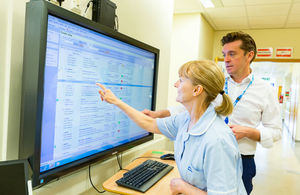UK: £7.5 million to digitally schedule shifts and save NHS staff time
NHS hospitals, clinics and pharmacies across 38 more trusts will be able to save staff time and money by rolling out digital shift planning, known as e-rostering systems, thanks to £7.5 million government funding.
During the pandemic, e-rostering has proven instrumental when redeploying staff, reporting absences and managing working hours and pay information, notably for vaccination centres. NHS trusts have reported an increased appetite across clinicians to implement e-rostering as a result.
E-rostering allows clinicians to select shifts digitally, providing them with more flexibility and more efficient work schedules. Specific skillsets can more easily be matched to the right shifts when redeploying staff using digital staff passports. The passports are currently being piloted and can save staff and HR teams time by providing a verified record of identity, employment and training on their smartphone. These have been used during the COVID-19 response to redeploy staff quickly to support areas in need.
A 2018 study (see footnote) showed one of the functions of e-rostering – caseload scheduling – could save each NHS clinician 34 minutes a week, which can add up to hundreds of hours per trust. By planning routes between healthcare settings or to patients’ homes for home visits, clinical resource can be geographically matched so NHS staff can spend less time travelling and more time with patients.
Minister of State for Care Helen Whately said:
People are at the heart of the NHS. Our doctors, nurses and other healthcare workers are the greatest asset we have. I’m determined to help NHS trusts get the best out of our talented healthcare workers and give patients the care they deserve.
We’re delivering on another commitment in the NHS Long Term Plan to support the use of electronic rosters. E-rostering is a crucial tool to make the most of our dedicated healthcare professionals’ time for looking after patients – something which is needed more than ever during this pandemic.
Managing shifts more effectively also makes it easier to work flexibly, giving our hardworking clinicians a better work/life balance. I’m pleased even more trusts will now benefit thanks to this £7.5 million funding boost.
I’m excited to see how this technology can be implemented in the future, not just in hospitals and pharmacies, but in social care too – making sure everyone gets the right care at the right time.
The trusts benefiting from this latest funding include mental health and community, specialist and general acute trusts.
The technology can also cut costs for the NHS by reducing the reliance on staffing agencies.
Five NHS trusts will be using the software to also schedule patient appointments.
The £26 million national rollout to 68 trusts in total is part of the NHS Long Term Plan ambition to equip all shifts for doctors, nurses, Allied Health Professionals, health scientists and pharmacists with e-rostering systems by the end of 2021.
Four NHS trusts which received funding earlier in the rollout have created the North West London Collaborative Staff Bank, a shared pool of available clinicians who can fill shift vacancies to match surges in demand from the pandemic and wider winter pressures.
This is part of a wider strategy by NHS England and Improvement and NHSX to build a collaborative and flexible workforce through the use of technology. The Department of Health and Social Care will continue to work with NHS trusts to improve and upgrade their workforce deployment systems.
Anna Stabler, Executive Chief Nurse at North Cumbria Integrated Care NHS Foundation Trust said:
We’re delighted to have been awarded this funding to help us develop a community workforce deployment system for our nurses and Allied Health Care Professionals working in the community. The funding will be utilised to deliver electronic rostering and case management systems that will in turn benefit our staff and patients alike.
It will mean our staff can support patients in a more timely manner, whilst reducing their travel time and improve their working arrangements. We’re very much looking forward to getting this piece of work underway.

